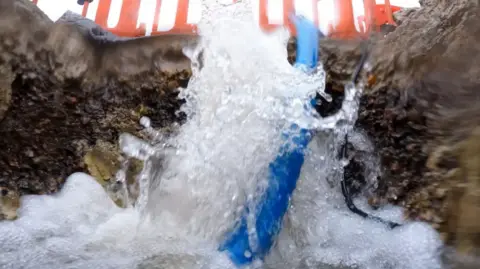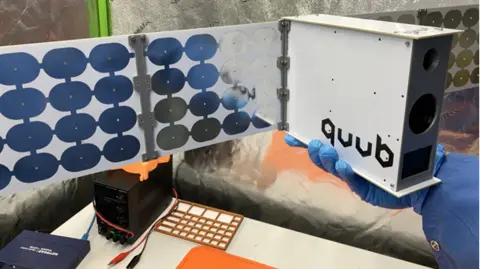AI satellites to improve water leak detection rates
 BBC
BBCUniversity researchers in Wolverhampton have been awarded £1.3m to use AI-driven satellite technology to help solve the costly and time-consuming process of detecting water leaks.
Alongside South Staffs Water, the team will build, launch and operate a fleet of Low Earth Orbit (LEO) micro satellites, which can find leaks "with unprecedented efficiency and precision".
Using AI techniques with high-resolution satellite imagery, researchers said they want to deliver faster, more accurate and cost-effective monitoring of leakage.
Detection costs are projected to be at least 10 times lower than current satellite-based methods, the university said.
Water loss is a persistent issue for the UK industry, with an estimated 19% of the supply lost before it reaches consumers, according to Water UK, costing £3.2bn annually across the utilities sector.
The university said traditional detection methods, such as acoustic monitoring and tracer gas detection, are labour-intensive and inefficient, typically locating fewer than one leak per day per crew and costing between £250 and £2,000 per inspection.
 University of Wolverhampotn
University of WolverhampotnOther satellite-based technologies have improved detection rates, but high operational costs and image refresh rates of between seven and 14 days still limit their effectiveness.
Using the £1.3m funding from water regulation service Ofwat's Innovation Fund, the team said they can create high-frequency imaging and have fresh data every six hours with sharper resolution to pinpoint leaks.
The AI-powered detection then reduces costs and enables rapid deployment beyond the UK, the university said.
Professor Mohammad Patwary, director of the university's digital innovation and solution centre (DISC) and project lead, said: "This Ofwat initiated opportunity marks a major innovation leap for the UK, enhancing the water industry's efficiency and infrastructure longevity, while creating a platform for critical sectors, like energy, transport, and telecom, and positioning the UK as a leader in LEO satellite-driven innovation and productivity."
The team will use six satellites as part of the project called Space Eye and liaise with several other water firms in the UK.
Follow BBC Wolverhampton & Black Country on BBC Sounds, Facebook, X and Instagram.
